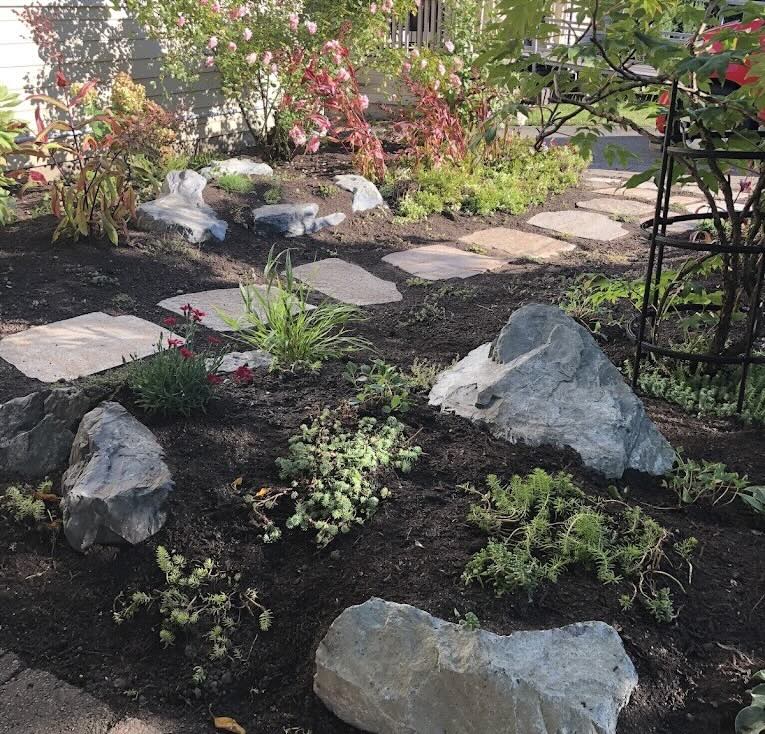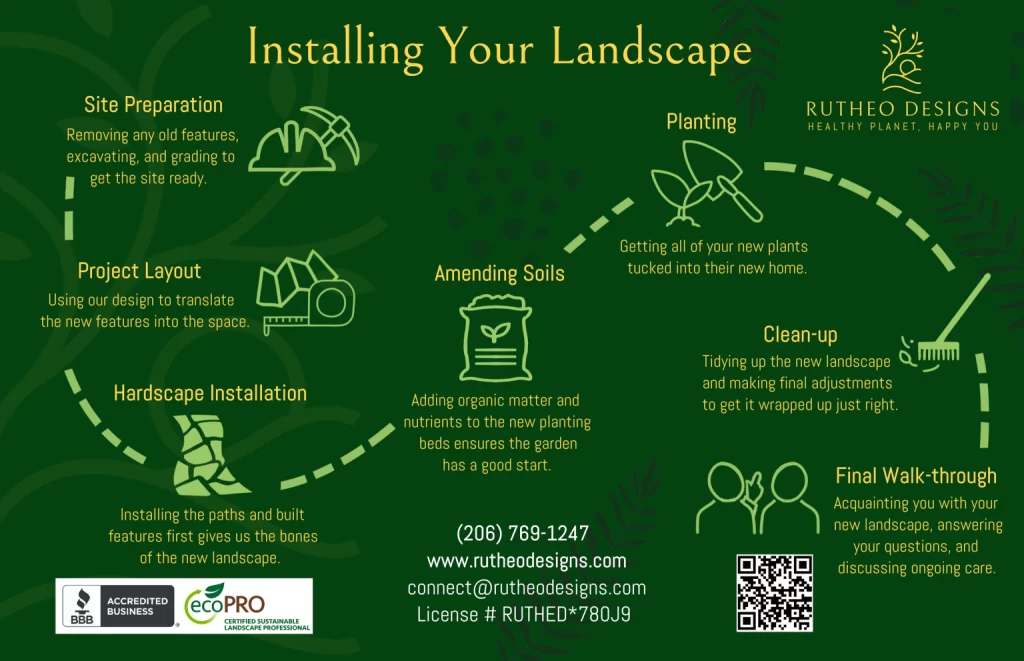
Hardscaping refers to the non-living elements of landscaping, such as patios, walkways, retaining walls, and driveways. Unlike softscaping, which focuses on plants, grass, and soil, hardscaping uses durable materials like stone, brick, and concrete to shape outdoor spaces. At Rutheo Designs, we emphasize the balance between hardscaping and softscaping to create landscapes that are both functional and sustainable.
Patios and terraces provide functional outdoor living spaces that are both beautiful and practical. When designing these areas, it is important to consider materials that support sustainability. Permeable pavers and recycled materials are excellent choices, as they help manage water runoff and minimize the environmental footprint of the construction process.
When designing an energy-efficient patio, it’s crucial to consider factors such as sun exposure and heat reflection. Strategic placement of trees and shading structures can reduce the need for cooling, while light-colored materials can further lower heat absorption. Proper drainage and runoff management should also be integrated into the patio design to prevent water accumulation and erosion, especially in areas with heavy rainfall.
Walkways and pathways are essential hardscaping elements that provide access while complementing the overall design of a landscape. We prioritize using permeable materials, like gravel or permeable concrete, to support water infiltration and prevent runoff. These materials allow water to soak into the ground, reducing erosion and helping maintain healthy soil.
In pathway design, aesthetics and sustainability go hand in hand. Curved paths with permeable surfaces not only enhance the visual appeal of a landscape but also promote water management. Regular maintenance is key to ensuring the longevity of these walkways, and choosing durable materials helps minimize the environmental impact of repairs and replacements.
Retaining walls serve both functional and aesthetic purposes in landscape design, particularly in areas prone to erosion or uneven terrain. Sustainable retaining wall materials include natural stone, recycled concrete, and eco-friendly composites. By using these materials, we can create long-lasting structures that also contribute to water management and erosion control.
In addition to supporting the landscape structurally, retaining walls can help redirect water flow and prevent soil erosion. These walls are especially useful in areas with steep slopes, as they protect plants and soil from heavy rainfall while integrating with the overall landscape design.
Driveways and parking areas often cover significant portions of a landscape, making material choices important for sustainability. Eco-friendly materials like permeable pavers and grass grids help reduce runoff, allowing water to seep into the ground. This is especially crucial in urban environments where impermeable surfaces can lead to water management challenges.
To maximize water absorption, driveways can be designed with slight gradients and integrated drainage systems that guide excess water to permeable areas. Combining these elements with eco-friendly materials ensures that driveways contribute positively to the landscape’s overall sustainability.
Permeable materials are a cornerstone of sustainable hardscaping. These materials, such as permeable pavers, gravel, and porous concrete, allow water to filter into the soil, replenishing groundwater and reducing surface runoff. By improving stormwater management, permeable hardscaping promotes healthier plant life and prevents soil erosion.
Incorporating energy-efficient lighting into hardscaping is another way to enhance sustainability. Solar-powered lights or low-energy LED systems reduce electricity usage while maintaining the ambiance of outdoor spaces. We also focus on strategies that reduce light pollution, such as down-lighting and timers, to ensure that outdoor lighting is both functional and eco-friendly.
Urban landscapes often experience higher temperatures due to heat-absorbing surfaces. By choosing materials that reflect rather than absorb heat, such as light-colored pavers, we can reduce the heat island effect. This not only improves the comfort of outdoor spaces but also supports local climate control efforts.

At Rutheo Designs, we are dedicated to transforming your outdoor spaces into beautiful, sustainable landscapes that reflect your vision and the unique character of the Seattle area. Whether you’re looking to enhance your garden with native plants, need expert advice on water-efficient irrigation systems, or want to discuss a comprehensive landscape design, our team is here to assist you every step of the way. We understand that every project is unique, and we take the time to listen to your needs and offer personalized solutions that align with your goals and the local environment.
Our services cover everything from initial consultation and design to full installation of hardscaping, softscaping, irrigation systems, and outdoor lighting. We ensure each element of your landscape is expertly installed and ready to thrive for years to come.
We invite you to reach out to us to start the conversation about your landscaping needs. You can contact us by email at connect@rutheodesigns.com or give us a call at (360) 844-2989. Whether you have specific questions or are ready to schedule a consultation, we’re eager to help you bring your outdoor vision to life with the care and expertise that Rutheo Designs is known for.